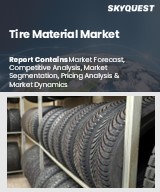
Report ID: SQMIG25A2435
Skyquest Technology's expert advisors have carried out comprehensive research on the tire material market to identify the major global and regional market trends and growth opportunities for leading players and new entrants in this market. The analysis is based on in-depth primary and secondary research to understand the major market drivers and restraints shaping the future development and growth of the industry.
Surge in Electric Vehicle Adoption
Push for Sustainable and Bio-Based Materials
Volatility in Raw Material Prices
Stringent Environmental Regulations
REQUEST FOR SAMPLE
Global Tire Material Market size was valued at USD 84.63 Billion in 2023 and is poised to grow from USD 89.28 Billion in 2024 to USD 137.02 Billion by 2032, growing at a CAGR of 5.5% in the forecast period (2025-2032). The global tire material market is witnessing steady growth, driven by rising vehicle production, increasing demand for electric and hybrid vehicles, and growing emphasis on sustainable mobility solutions. Manufacturers are continuously innovating with advanced materials like high-durability synthetic rubbers, bio-based polymers, and eco-friendly fillers to meet the evolving performance, safety, and environmental requirements.
The global tire material industry is characterized by intense competition, with a mix of established companies and emerging players focusing on innovation, sustainability, and performance enhancement. Leading companies are integrating advanced materials like silica, synthetic rubber, and bio-based compounds into their tire production processes to meet the growing demand for eco-friendly and high-performance tires. In 2024, one of the key strategies adopted by major players is the expansion of their product portfolio to cater to the rising market for electric vehicles (EVs). Companies are also leveraging technological advancements to enhance tire durability, reduce rolling resistance, and improve fuel efficiency. 'Goodyear', 'Titan International', 'TDK Corporation', 'Michelin', 'Bridgestone', 'Continental', 'Sailun Group', 'Yokohama Rubber', 'Maxxis', 'Toyo Tire', 'Hankook', 'Pirelli', 'Kumho Petrochemical', 'Lehigh Technologies'
The global shift toward electric mobility is creating a substantial demand for high-performance tire materials. Electric vehicles (EVs) require tires with low rolling resistance, high torque endurance, and enhanced durability. As a result, advanced materials such as functionalized SBR (styrene-butadiene rubber), silica-reinforced compounds, and specialized carbon blacks are gaining traction. The rising sales of EVs are compelling tire manufacturers to innovate with materials that improve efficiency, grip, and wear resistance, thereby propelling the market forward.
Advancement of Smart Tire Materials: A prominent tire material market trend is the emergence of smart tire materials embedded with sensors and responsive properties. These materials allow real-time monitoring of tire wear, pressure, temperature, and road conditions, enhancing vehicle safety and performance. Particularly relevant for fleets and autonomous vehicles, these innovations are helping manufacturers move toward intelligent, connected tires.
How is the Demand for Electric Vehicles Influencing Tire Material Innovation?
Want to customize this report? This report can be personalized according to your needs. Our analysts and industry experts will work directly with you to understand your requirements and provide you with customized data in a short amount of time. We offer $1000 worth of FREE customization at the time of purchase.
Feedback From Our Clients

Report ID: SQMIG25A2435
sales@skyquestt.com
USA +1 351-333-4748